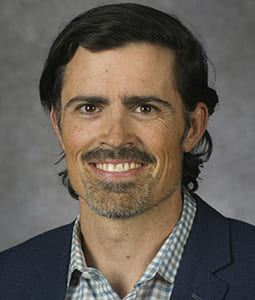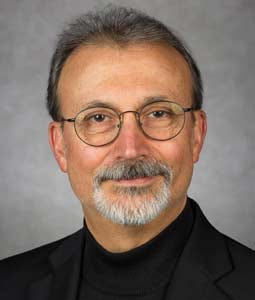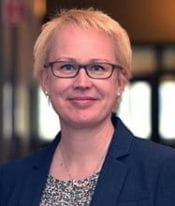We all approach creative work and innovativeness differently, drawing from our disciplinary backgrounds, professional experiences, cognitive schemas, and even daily moods and feelings. In this panel, experts, whose daily work involves creative work, innovativeness, and promoting the entrepreneurial mindset, will share how they approach innovation. What are their recipes for promoting everyday innovations, and even more radical ones? And how can people from different backgrounds and disciplines successfully come together to embrace creative processes for innovation?
Robert Steel,
Associate Professor
Jarvis College of Computing and Digital Media

Robert Steel is a composer for cinema, theater, and other media. Recent credits include the films Get the F**k Outta Paris (Sound of Silent Film Festival Chicago), Eye Doctor of Death (VR), Hominidae (Sundance Film Festival and Cannes), Oh Baby!, Junk Girl (Sound of Silent Film Festival Mexico City), and Edge of Alchemy (Sound of Silent Film Festival Chicago) and the augmented reality installation you have just been murdered (New York). He is an Associate Professor at the School of Cinematic Arts at DePaul University where he is head of the sound design program and the CDM Sound Studios. He has been a mentor with the Sundance Collective Kitchen. His research is focused on virtual exchange and the nature of collaboration. Presentations on the research were delivered at the Audio Engineering Society (U.S and Germany), University Film and Video Association (U.S.), and the International Virtual Exchange Conference (U.S. and Spain). He is a recipient of the DePaul University Excellence in Teaching Award, numerous DePaul University grants, a Cue/Next grant (computing and the arts/NSF funded), Global Learning Experience Grants, and awards from ASCAP and the Illinois Arts Council.
Lamont Black,
Assistant Professor Finance
Driehaus College of Business

Dr. Lamont Black is a recognized expert on cryptocurrency and blockchain who is a regularly invited speaker for conferences, board presentations, and the media. His teaching on cryptocurrency at DePaul covers aspects of money and investing and has been featured in the Chicago Tribune. In his graduate course on blockchain, he works with business and computer science students to build real-world blockchain applications. Dr. Black also teaches courses on money, banking, financial markets, and data analytics. Prior to joining DePaul, Dr. Black was an economist at the Federal Reserve in Washington D.C.
Jennifer L. Rosato Perea,
Dean and Professor of Law
College of Law

Now in her second term at DePaul and fifteenth year as a law dean, Jennifer Rosato Perea has served as dean of DePaul University College of Law since 2015. A nationally recognized leader in legal education, Dean Rosato Perea brings a wealth of experience to DePaul as an experienced administrator, a longtime advocate of student engagement and professionalism, and a respected legal scholar. One of only a small number of Latina law school deans in the nation, she has been recognized and honored for her commitment to diversity through her presentations to national organizations, mentoring, and creation of innovative programs. Most recently, Dean Rosato Perea received the Leonard Jay Schrager Award of Excellence 2022 from the Chicago Bar Foundation, and the Chicago Lawyer Top 50 Women in Law 2022. She also has presented nationally and regionally on the future and challenges of legal education before a variety of organizations, including the Association of American Law Schools and the American Bar Association. Dean Rosato Perea is an accomplished scholar and expert on family law, bioethics and legal ethics, having published extensively on a variety of legal issues affecting children and families. Prior to joining DePaul, she served as dean of Northern Illinois University College of Law for six years.
Moderator: Guillermo Vásquez de Velasco,
Dean, College of Liberal Arts and Sciences

Guillermo Vásquez de Velasco is dean and professor of Art, Media and Design in the College of Liberal Arts and Social Sciences. Previously, he has served as vice provost and dean of the College of Architecture and Planning at Ball State University, and as executive associate dean of the College of Architecture at Texas A&M University.
Recipient of multiple awards and recognitions, Vásquez de Velasco has combined professional practice in architecture and urbanism, with teaching, scholarship, and academic administration into a career that celebrates Design Thinking, multidisciplinary collaboration and the constant exploration of digital technologies in design and education. He is a passionate advocate of the critical mission of the liberal arts in the 21st century and its key function in the education of future leaders. In recognition of his seminal work in the early development and use of digital technology in education he received a Teaching Excellence Award from the Association of Former Students of Texas A&M University, and for the development of a wide variety of innovative international programs in Europe, Latin America, and Asia he was also recognized with the TAMU International Excellence Award.
Chair: Maija Renko,
Professor & Coleman Chair of Entrepreneurship
Driehaus College of Business

Maija Renko teaches entrepreneurship and social entrepreneurship classes at DePaul University’s Driehaus College of Business. Her research and teaching interests are focused on the early stages of the entrepreneurial process, social entrepreneurship, and technology entrepreneurship. Her research has been published in leading management and entrepreneurship journals, and she has received a number of grants to support her research activities. Dr. Renko’s teaching and research contribute to a better understanding of how entrepreneurs build successful businesses that not only generate financial rewards for those involved, but also contribute to positive social change, a sense of achievement for those– often disenfranchised members of the society– involved, and the advancement of society through the introduction of innovations.